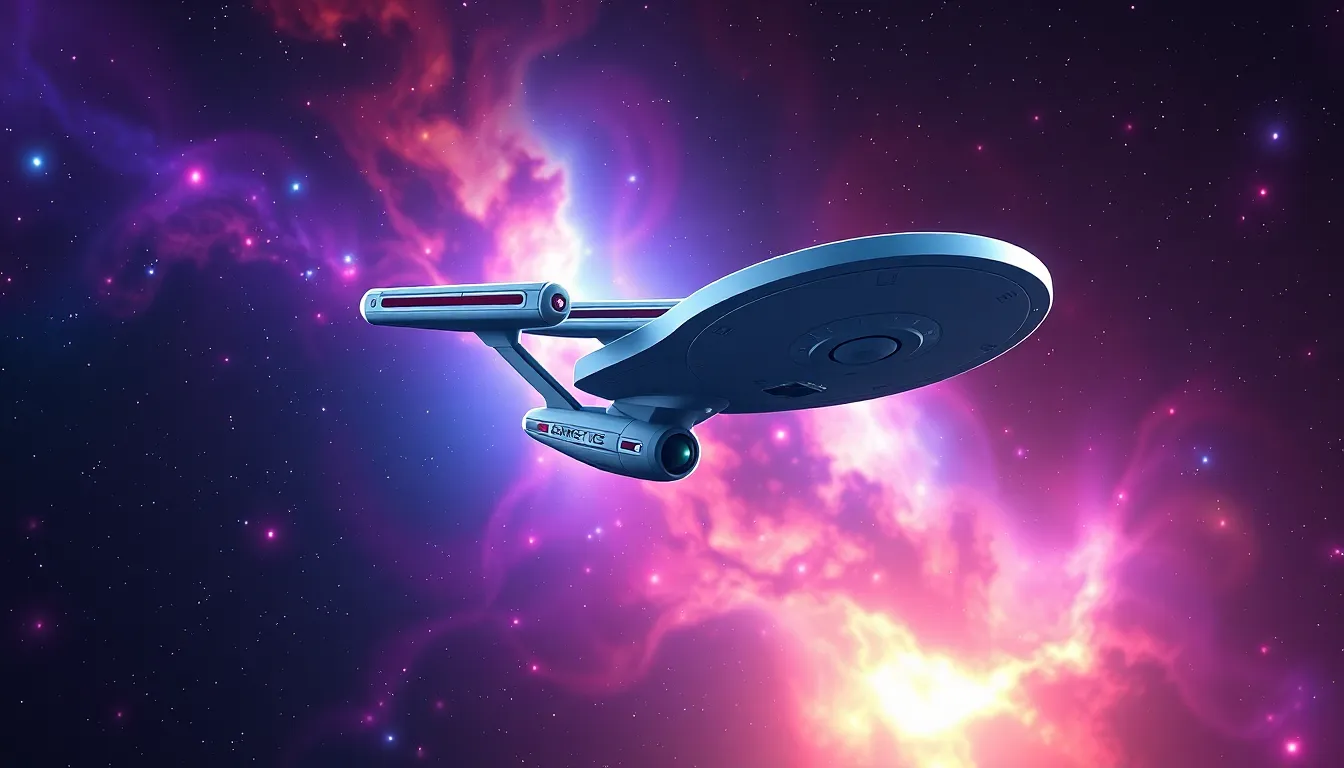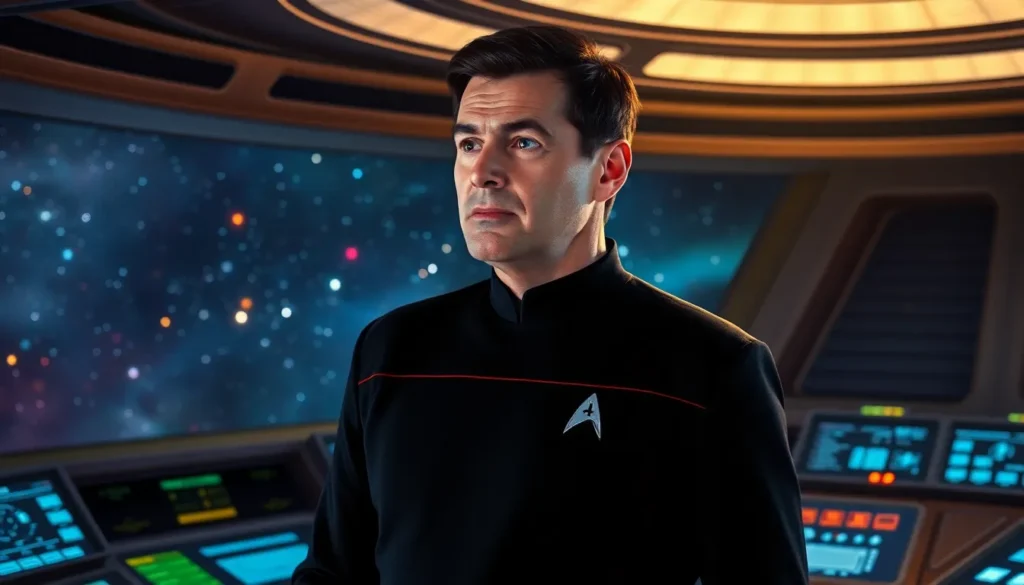Boldly going where few franchises have ventured, Star Trek: The Next Generation (TNG) not only revolutionized television but also launched a series of films that expanded its iconic universe. From the charmingly awkward moments of Captain Picard to the mind-bending adventures that test the limits of space and time, these movies offer a delightful mix of drama, humor, and interstellar intrigue.
star trek tng movies
“Star Trek: The Next Generation” produced four films, expanding the storyline beyond its television roots. Each film preserves the essence of TNG while introducing exciting new narratives.
“Star Trek: Generations” (1994) centers around Captain Picard and the nexus, intertwining their fates with Captain Kirk. This film bridges the classic series with TNG, creating a compelling connection across generations.
“Star Trek: First Contact” (1996) explores humanity’s first encounter with the Borg. The film showcases the crew’s determination to save Earth from assimilation, highlighting themes of bravery and sacrifice. Notably, it remains a fan favorite due to its thrilling action and character depth.
“Star Trek: Insurrection” (1998) tells the story of the crew’s moral dilemma over protecting a peaceful race from the Federation. Ethical questions arise about technological advancements and the true cost of progress. This film emphasizes the series’ core values of humanity and compassion.
“Star Trek: Nemesis” (2002) features a clone of Captain Picard as the antagonist. The narrative delves deep into identity and legacy, ultimately leading to a heartbreaking conclusion. Fans appreciate the film for its emotional weight and its reflection on leadership.
These movies capture the spirit of TNG while expanding its universe. Each installment offers unique themes and conflicts, resonating with both long-time fans and new audiences. The films serve as a testament to the lasting impact of TNG, ensuring its place in the history of science fiction cinema.
Theatrical Releases

Four films extend the narrative and themes of “Star Trek: The Next Generation.” Each entry explores distinct stories while maintaining the series’ legacy.
Star Trek: Generations
“Star Trek: Generations” premiered in 1994. This film bridges the original series and TNG by introducing Captain Kirk’s encounter with Captain Picard. A Nexus ribbon plays a crucial role in shaping the characters’ destinies. Themes of legacy and the passage of time emerge as Picard confronts his past and future. The film showcases emotional depth, emphasizing sacrifice as Picard navigates his responsibilities. Important connections enrich the storytelling, offering fans a nostalgic experience.
Star Trek: First Contact
“Star Trek: First Contact” debuted in 1996. This installment focuses on humanity’s initial encounter with the Borg, presenting a direct threat to the Federation. The crew of the USS Enterprise-E battles to prevent a catastrophic assimilation of Earth. Resilience and courage shine through as Captain Picard faces his demons and recalls his experience as a Borg. Various characters highlight teamwork, showcasing the importance of unity in overcoming obstacles. This film resonates deeply with fans through its exploration of fear, hope, and human spirit.
Star Trek: Insurrection
“Star Trek: Insurrection” released in 1998. This film delves into a moral dilemma faced by the crew regarding the protection of the Ba’ku people. Ethical questions arise as the Federation grapples with the implications of technology and interference. Captain Picard upholds the prime directive, leading a confrontation against Starfleet. Each character’s integrity and humanity emerge, reinforcing the series’ core values. Engaging storytelling captures audiences by highlighting themes of compassion and the struggle for autonomy.
Star Trek: Nemesis
“Star Trek: Nemesis” hit theaters in 2002. This film centers on identity as Captain Picard encounters his genetically engineered clone, Shinzon. Conflict ensues over issues of legacy and the consequences of creation. Deep emotional stakes drive the narrative, culminating in a powerful and tragic conclusion. The crew’s loyalty and moral choices test their resolve, resonating with long-time fans. With action-packed sequences and philosophical undertones, this film offers a fitting, complex finale to the TNG cinematic journey.
Themes and Story Arcs
“Star Trek: The Next Generation” (TNG) movies delve into profound narratives and philosophical inquiries, enhancing the series’ legacy. Each film explores human nature, technological advances, and moral complexities.
Exploration of Humanity
Themes of exploration resonate deeply throughout the TNG films. “Star Trek: Generations” examines legacy and the human condition, showcasing how past actions influence the future. Characters confront personal dilemmas, fostering emotional connections with audiences. “Star Trek: First Contact” illustrates humanity’s resilience in the face of existential threats. The crew embodies courage and teamwork while combating the Borg, emphasizing the importance of unity. In “Star Trek: Insurrection,” the moral dilemmas faced by the crew highlight compassion and ethical decision-making. The dilemma surrounding the Ba’ku people’s protection invites reflection on cultural integrity. Through these narratives, TNG films showcase the spectrum of human experience, enriching its cinematic journey.
Technological Evolution
Technological advancements play a critical role in shaping the narrative of the TNG films. “Star Trek: First Contact” introduces viewers to advanced spacecraft and cutting-edge weaponry that underscore humanity’s progress. The Borg’s technology serves as a significant threat, emphasizing the consequences of unchecked innovation. “Star Trek: Nemesis” introduces a sophisticated clone of Captain Picard, prompting questions about identity and the implications of genetic engineering. Each film presents technology as a double-edged sword—capable of incredible advancement but also destructive potential. This exploration mirrors contemporary concerns about technological evolution, inviting audiences to consider its impact on society and ethics. Through dynamic storytelling, TNG films continue to resonate within the landscape of science fiction cinema.
Character Development
Character development in “Star Trek: The Next Generation” films showcases growth and transformation across the series. Each character’s journey adds depth to the overarching narrative, allowing audiences to connect on multiple levels.
Captain Jean-Luc Picard
Captain Jean-Luc Picard embodies leadership and moral integrity. Through the films, his character wrestles with themes of legacy and responsibility. In “Generations,” Picard’s encounter with Kirk highlights his struggle to find meaning in his own command. Growth becomes evident as he faces personal loss and confronts his past choices in “Nemesis.” The transformation from a starship captain to a mentor reflects his evolution and underscores the importance of legacy in the face of adversity. Emotional depth and moral dilemmas challenge Picard, making him a nuanced protagonist.
Commander William Riker
Commander William Riker illustrates the balance between duty and personal desires. His journey unfolds from a loyal first officer to a capable captain in “Star Trek: Nemesis.” Riker’s romantic relationship with Counselor Troi adds complexity, exploring themes of commitment and vulnerability. In “First Contact,” Riker showcases bravery as he leads the crew against the Borg threat. His willingness to take risks and confront challenges signifies growth in leadership. Each film reveals layers of his character, enhancing viewer engagement through relatable struggles and aspirations.
Lieutenant Commander Data
Lieutenant Commander Data represents the quest for humanity. His evolution throughout the films focuses on understanding emotions and identity. In “First Contact,” Data confronts his longing to experience feelings, highlighting the conflict between his programming and human aspirations. The exploration of his relationship with the Borg ultimately forces him to examine his sense of self. Data’s pursuit of what it means to be human deepens in “Nemesis,” where his sacrifice becomes a profound statement on loyalty and self-discovery. Each moment highlights his unique struggle to embrace humanity within his cybernetic existence, resonating with audiences.
Critical Reception
The “Star Trek: The Next Generation” films garnered mixed responses from audiences and critics alike. Box office results showed varying levels of success, reflecting the franchise’s evolving popularity.
Box Office Performance
“Star Trek: Generations” earned approximately $75 million worldwide. Its blend of classic characters attracted a broad audience but fell short of expectations. In contrast, “Star Trek: First Contact” achieved significant success, grossing over $90 million, marking it as the highest-grossing film in the TNG series. Throughout its run, “Star Trek: Insurrection” struggled, collecting about $60 million and underperforming against its predecessors. Finally, “Star Trek: Nemesis” faced notable challenges, only bringing in around $43 million, signaling a decline in box office appeal.
Critics’ Reviews
Critics offered diverse opinions on the TNG films. “Generations” received praise for its emotional depth but faced criticism for pacing issues. Reviewers lauded “First Contact” for its action and character development, often considering it a standout in the series. Conversely, “Insurrection” faced mixed reviews, with many viewing its narrative as weaker than earlier installments. “Nemesis” was met with disappointment, as critics pointed out its lack of originality and depth in character exploration. The overall reception highlighted both the strengths and weaknesses of the films, showcasing the challenge of adapting a beloved television series to the big screen.
Fan Impact and Legacy
“Star Trek: The Next Generation” (TNG) significantly influenced its fan base and left a lasting legacy on the science fiction genre. Fans embraced the series for its thoughtful portrayal of complex themes, compelling characters, and innovative storytelling. Community engagement expanded through conventions, fan clubs, and online forums, fostering a support network that examined the series’ philosophical inquiries.
The films building upon TNG reinforced this deep connection. Fans celebrated the continuation of beloved characters and narratives, stimulating interest in the broader Star Trek universe. Memorable moments from films like “First Contact” and “Generations” gave rise to discussions about morality, ethics, and the future of humanity. Each film crafted new lore that integrated seamlessly into the existing framework.
Merchandising tied to TNG and its films thrived, with collectibles, apparel, and home media appealing to dedicated followers. Events and screenings further united fans, who participated in shared experiences and discussions, enhancing their bond. This engagement showed the enduring passion for TNG and its cultural relevance.
Critical reception impacted how fans viewed the films’ legacy. Box office performance highlighted successes and challenges, with “First Contact” standing out as a fan favorite, while “Nemesis” was met with disappointment. Despite varied critical responses, devotion to TNG never waned, with many fans considering the overall narrative and character arcs as integral to Star Trek’s identity.
Generational connections emerged within fandom, where parents introduced their children to TNG, ensuring that its themes resonate with new audiences. Discussions around morality, technology, and humanity continue, keeping the conversation alive. Star Trek: TNG established a legacy that transcends generations, leaving an indelible mark on science fiction.
Conclusion
The legacy of “Star Trek: The Next Generation” movies endures as a testament to the series’ ability to blend compelling storytelling with profound themes. Each film contributes uniquely to the overarching narrative while exploring the complexities of humanity, technology, and morality.
Fans continue to celebrate the character growth and moral dilemmas faced by the crew, fostering a community that spans generations. Despite mixed critical reception, the emotional depth and philosophical inquiries of the TNG films resonate with audiences, ensuring their place in the science fiction canon.
As new viewers discover these films, the timeless themes of exploration, ethics, and identity remain relevant, solidifying “Star Trek: The Next Generation” as a cornerstone of cinematic storytelling.

